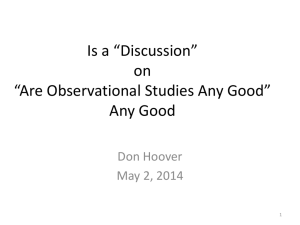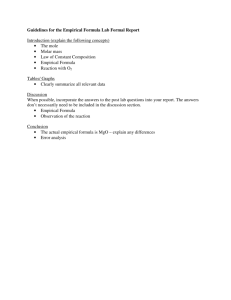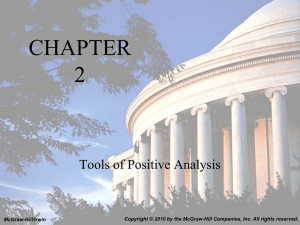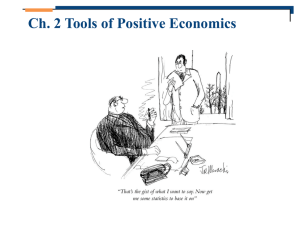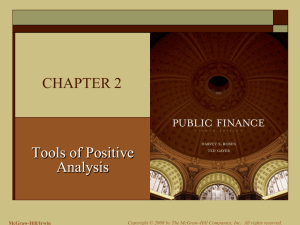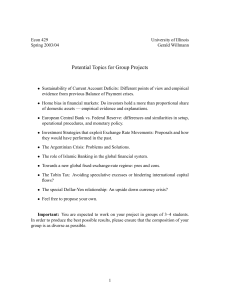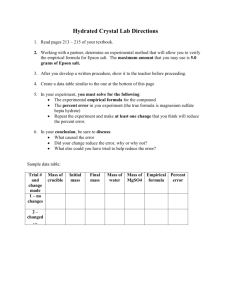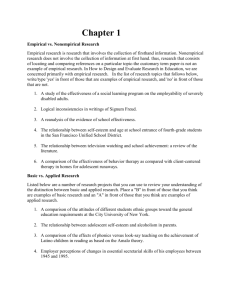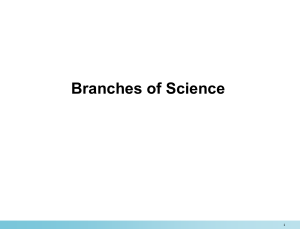Empirical Work
advertisement
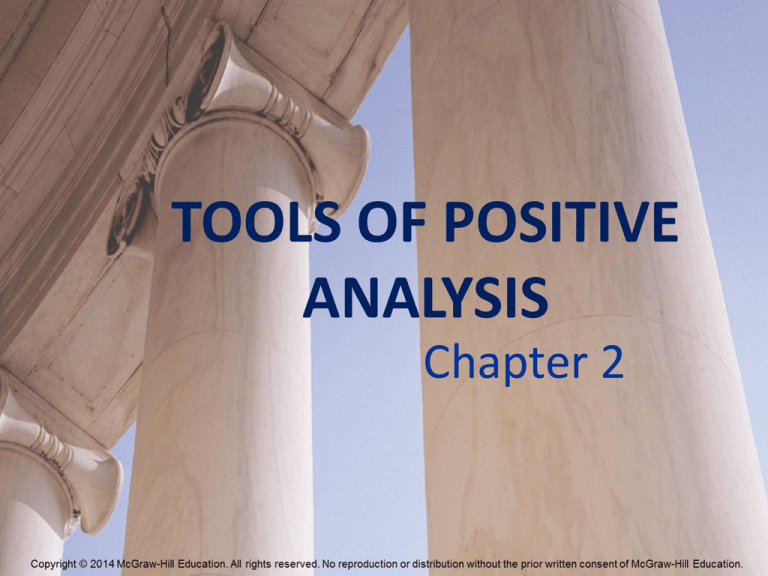
TOOLS OF POSITIVE ANALYSIS Chapter 2 Public Finance and Positive Analysis One goal of Public Finance is to estimate how government policy affects individuals’ behavior. 2-2 The Role of Theory • Economic models – Provide frameworks for thinking about the factors that might influence behavior. – Generate hypotheses whose validity can be assessed through empirical work. – Virtue of simplicity: reduces a problem to its essentials. • Empirical analysis: Analysis based on observation and experience. – Used to test hypotheses. 2-3 Causation vs. Correlation • Conditions required for government action X to cause societal effect Y rather than just correlate (move together) with effect Y. – X must precede Y – X and Y must be correlated – Other explanations for any observed correlation must be eliminated • The importance of the distinction for policy. – Example: There is a positive correlation between being married and wages…Does that mean government should enact a policy encouraging marriage as a way of increasing wages? 2-4 Empirical Work: Experimental Studies • Experimental (or randomized) study: subjects are randomly assigned to either a treatment group or control group. – Treatment Group: Group of people who are subject to the intervention being studied. – Control Group: Comparison group of people who are not subject to the intervention being studied. 2-5 Empirical Work: Experimental Studies • Randomization improves the chances that the control and treatment groups have similar characteristics – Focus can then be on possible causation between treatment and outcome. • Randomization has a large potential to eliminate biased estimates. – Biased estimate: conflates the true causal impact with the impact of outside factors. 2-6 Pitfalls of Experimental Studies • • • • • Ethical issues Technical problems Response bias Impact of limited duration of experiment Generalization of results to other populations, settings, and related treatments • Black box aspect of experiments 2-7 Empirical Work: Observational Studies • Observational study – empirical study relying on observed data not obtained from experimental study • Sources of observational data – Surveys – Administrative records – Governmental data • Econometrics: statistical techniques to establish and estimate causal relationships in absence of randomization. 2-8 Conducting Observational Studies Estimating Relationships • • L = α0 + α1wn + α2X1 + … + αnXn + ε – Dependent variable – Independent variables – Parameters – Stochastic error term Regression analysis – Regression line: • Best fit through scatter of data – Standard error • Indicates reliability of equation L Slope is α1 Intercept is α0 α0 wn 2-9 Empirical Work: Types of Observational Study Data • Cross-sectional data: contains information on individual entities at a given point in time. • Time-series data: contains information on a single entity at different points in time. • Panel (longitudinal) data: combines features of both. – Contains information on individual entities at different points in time. 2-10 Pitfalls of Observational Studies • Data collected in non-experimental setting – Difficult to ensure that the control group forms a valid “counterfactual” • Counterfactual: the outcome for people in the treatment group had they not been treated. • Specification issues – Not all variables that should be included are available in dataset and/or cannot be measured. 2-11 Empirical Work Quasi-Experimental Studies • Quasi-experimental study (natural experiment) – observational study relying on circumstances outside researcher’s control to mimic random assignment • Successful Quasi-Experiments hinge on ensuring the treatment group assignment is random. – Difference-in-Difference Quasi-Experiments. – Instrumental Variables Quasi-Experiments – Regression-Discontinuity Quasi-Experiments 2-12 Pitfalls of Quasi-Experimental Studies • Assignment to control and treatment groups may not be random • Not applicable to all research questions • Generalization of results to other settings and treatments might not be possible. 2-13 Chapter 2 Summary • Economic theory provides a framework for analyzing the causal relationship between government policy and individuals’ behavior. • Empirical work tests hypothesis arising from economic theory to determine if it is consistent with real-world phenomena. • Various methods for conducting empirical work exist. 2-14
